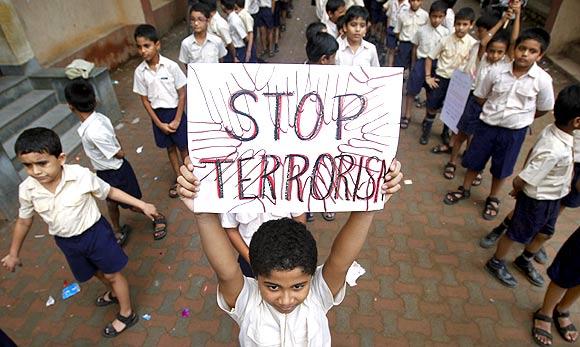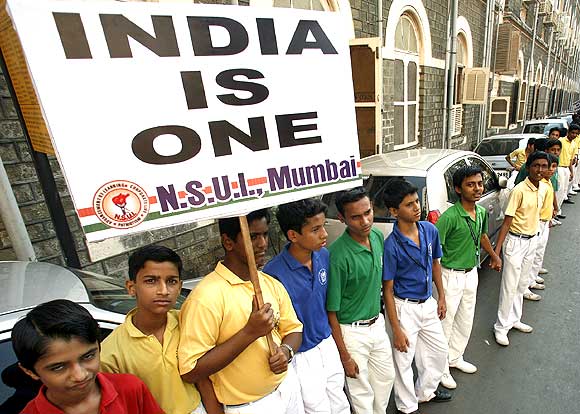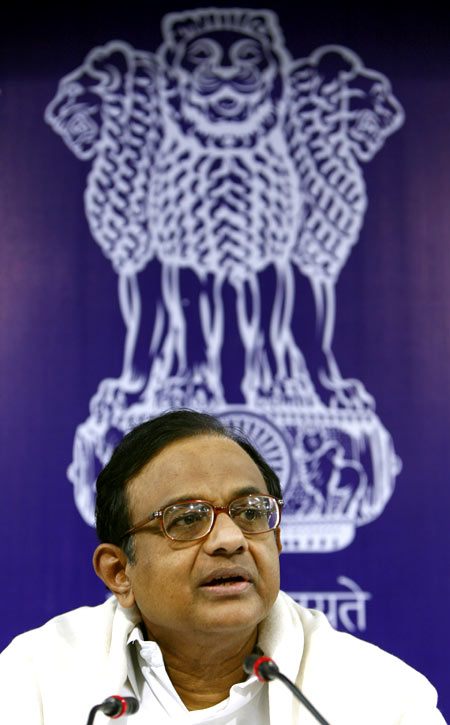
The government must seriously consider enlarging the scope of its counter-terrorism policy to covertly eliminate the leaders of terrorist organisations abroad who are sponsoring terrorism in India, says Brigadier Gurmeet Kanwal (retd).
The Cabinet Committee on Security, CCS, gave its approval to the establishment of the National Counter-terrorism Centre, NCTC, in mid-January, two years after it was first conceived following the Mumbai terror strikes on November 26, 2008.
However, urban terrorism continues to remain a cause for concern and much still remains to be done in the planning and execution of India's counter-terrorism policies.
While the year gone by did not witness major terrorist attacks, systemic weaknesses in India's counter-terrorism policy are continuing to hamper its successful execution.
Even though recent terrorist strikes have been sporadic and have been spaced out in time, the overall impression that has been created is that of an unstable internal security environment in which the initiative lies with the terrorist organisations and they are able to strike at will.
The government needs to review its largely reactive policies and adopt proactive measures to fight terrorism, particularly the variety that emanates from the soil of inimical neighbouring countries.
A democratically elected government ultimately has to reflect the will of the people in its policies. However, the 'Panipat Syndrome' appears to have been deeply ingrained into the Indian psyche, in that the leaders and the bureaucracy react only when the tiger is already at the doorstep.
What is needed is a coordinated approach, with all organs of the State coming together to formulate and implement a national-level counter-terrorism strategy to fight terrorism.
The government must draw up a comprehensive strategy that is inter-ministerial, inter-agency and inter-departmental in character. Such a strategy must also balance the interests of the central and the state governments.
Please ...

India's response to the Mumbai terror attacks in November 2008 was slow and laborious and poorly coordinated among the central and the state governments and their various agencies.
Coastal security was virtually non-existent; the marine police were too few in number to effectively patrol the vast area entrusted to them; they were ill-equipped and inadequately trained; and, there was poor coordination between the coast guard and the marine police.
It took far too long to begin flushing out operations and then to eliminate the nine terrorists who were holed up at three separate locations.
A carefully drawn up counter-terrorism policy is at the heart of waging a successful counter-terrorism campaign. Peter R Neumann has written: 'Regardless of whether governments are dealing with 'old' or 'new' (terrorism), the aim must be to prevent terrorist attacks whilst maintaining legitimacy in the eyes of the population. In doing so, governments need to 'harden' potential targets; develop good intelligence in order to disrupt terrorist structures; bring to bear the full force of the law whilst acting within the law; address legitimate grievances where they can be addressed; and, not least, convey a sense of calm and determination when communicating with the public.'
This fundamental prescription cannot be faulted and Indian policy planners would do well to draw up a counter-terrorism policy on these lines as part of a comprehensive national security strategy.
Please ...

A country's counter-terrorism policy must hinge around strong laws to fight terrorism.
India's experiments with POTA (Prevention of Terrorism Act), TADA (Terrorist and Disruptive Activities (Prevention) Act) and UAPA (Unlawful Activities Prevention Act) have failed to deliver the desired results.
Laws must be just and humane, but must not be designed to either be vindictive towards or shield any particular community or religious denomination. The experience of many other countries has proved that it is possible to formulate strong yet egalitarian counter-terrorism laws.
The US established a strong department of homeland security following the 9/11 strikes and there has not been a major terrorist attack since then.
One major source of the lack of a coordinated approach is the gross disconnect between how the central and the state governments view counter-terrorism; there are glaring disparities in the views held in Delhi and the state capitals.
The Constitution must be amended to move 'law and order' from the state list to the concurrent list so that the central government can act on its own initiative when necessary, particularly in the case of externally-sponsored terrorism.
And it is time the government bifurcated the internal security function of the ministry of home affairs into a separate ministry headed by a Cabinet minister.
Besides prevention through accurate 'humint' and 'techint' intelligence gathering, successful counter-terrorism requires the effective intelligence penetration of terrorist groups so that their leadership can be systematically neutralised by an empowered anti-terrorism agency.
More comprehensive planning and better stage management are necessary for the quick elimination of a group of terrorists during a strike while the terrorists are on a killing spree.
Post-incident investigation is aimed at unravelling the identities of the planners and the plotters and bringing to justice the perpetrators of the incident of terrorism.
Please ...

The National Investigation Agency, NIA, needs to be re-modeled on the US Federal Bureau of Investigation to give it both preventive and investigative powers. The NIA must be reconstituted as it lacks teeth in its present form.
India's intelligence coordination and assessment apparatus at the national level remains mired in the days of innocence. While the requirement is for a strong National Counter-terrorism Centre, the approval accorded by the Cabinet Committee for Security is for a watered down version of the form in which the NCTC had been originally conceived by Home Minister P Chidambaram.
The NCTC had been envisaged as an umbrella organisation which would exercise control over agencies like the NIA, the National Technical Research Organisation, the Joint Intelligence Committee, the National Crime Records Bureau and the National Security Guard. It will now be placed under the Intelligence Bureau and the existing Multi-Agency Centre will be subsumed in it.
The NCTC will draw up and coordinate counter-terrorism plans, integrate intelligence gathering and coordinate with all existing investigating and intelligence agencies.
The NATGRID (National Intelligence Grid), which was approved by the Cabinet Committee on Security in June 2011, will provide a data bank of 20 database like travel records, immigration details and income tax records as inputs to the NCTC.
Finally, the government must seriously consider enlarging the scope of its counter-terrorism policy to covertly eliminate the leaders of terrorist organisations abroad who are sponsoring terrorism in India.
Unless the problem is addressed at its roots, the solution will remain beyond the grasp of the government.
Brigadier Gurmeet Kanwal (retd) is Director, Centre for Land Warfare Studies, a New Delhi-based think-tank.
...